I think I can now safely say that all of our five colonies made it through winter. I am not completely satisfied with this result as two are small, only on about four to five frames. A perfect result would have been five booming colonies with brood boxes full to the brim.
Still, I know we are lucky to have our bees safe and well, as the blogs I read around the world remind me that not all colonies make it through winter. We have not opened our hives to find the heartbreaking sight of a tiny dead cluster. Our success has probably been aided by a 2014 which was a dream year for weather, with plenty of warm, sunny days interspersed by light rain to keep the nectar flowing.
Having five colonies does mean a lot of work though, especially at this time of year. Endless hammering together of frames (my least favourite job) and stirring sugar into water to make syrup to encourage the bees to draw out fresh new combs as part of the Bailey comb exchange. Then transporting the heavy syrup to the bees, trying to find a space to fit with my bulky bee equipment on a packed Saturday bus. Rushing down to the allotment before work, or rushing over afterwards when it’s nearly getting dark. Broken nails and yellow propolis stained hands.
I am grateful for the sunshine though, and am enjoying watching all the new flowers coming along. The bluebells are here!
Last weekend I helped out at a practical session for the new recruits taking the Ealing association’s annual beginners course. I supervised them inspecting a few hives, showing them how to turn the frames and what they were looking at. There were about thirteen of them, so as you can imagine there were plenty of questions. Everything is new; they are learning the complete basics of what pollen, nectar, honey and brood look like. Some of them didn’t know what a varroa mite was (such blissful innocence).
When opening up hives with beginners my main worry is not that the bees will hurt them, but that they will hurt the bees. It’s hard for them to remember that they should hold the frames over the hive, as otherwise the queen could fall or fly to the floor and get squashed. Still, I did think the lady who watched without a veil on was extremely brave; she obviously has not been stung under the eye before. Beginners tend to be obsessed by two things: honey and finding the queen. We found some queens and saw plenty of honey so that was good.
When I told Drew about the beginners session, he said “Will the first lesson be how to eat cake?”. I explained to the beginners that the association is really just a tea and cake club with the beekeeping as an excuse on the side, but I’m not sure they believed me. They’ll learn.
When I visited the allotment bees, I was amused to discover that they’ve propolised the block of wood that sits over one of the crown board holes so that it’s propped up at a jaunty angle. The power of propolis!
Bees hanging out underneath the wood. They’ve built some comb under there too.
The second time I’ve spotted this flower emerge at the Barbican centre. It’s a snake’s head fritillary, official name Fritillaria meleagris. They used to grow in meadows alongside the river Thames and were collected in huge quantities to be sold in London markets, but have now become a rarely seen wildflower. A lot of their habitat was destroyed during World War II, when most of the ancient meadows became used for food crops.
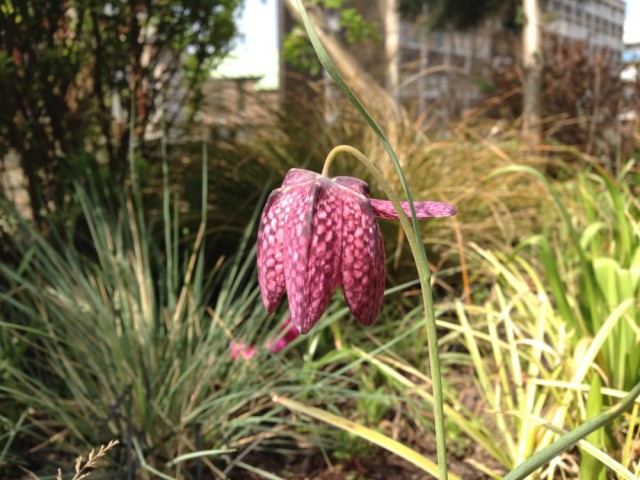
The running around after the bees recently has left me partly happy to see them again but also quite exhausted. We are arranging to sell two colonies, but sometimes I have thoughts about giving up beekeeping completely, or at least giving up one of the sites. The main thing stopping me is that I enjoy being with the bees and it would be a shame to lose the skill. I would miss the bees but not all the logistics of storing and transporting equipment. Perhaps I’ll see how it goes this summer. Have you ever thought about giving up beekeeping?

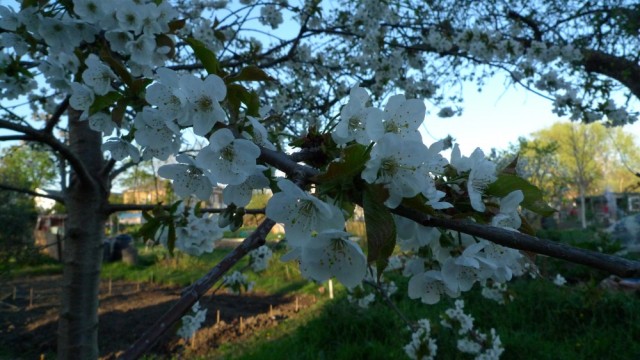
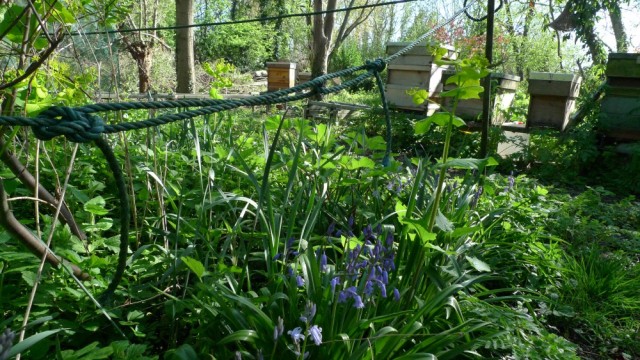

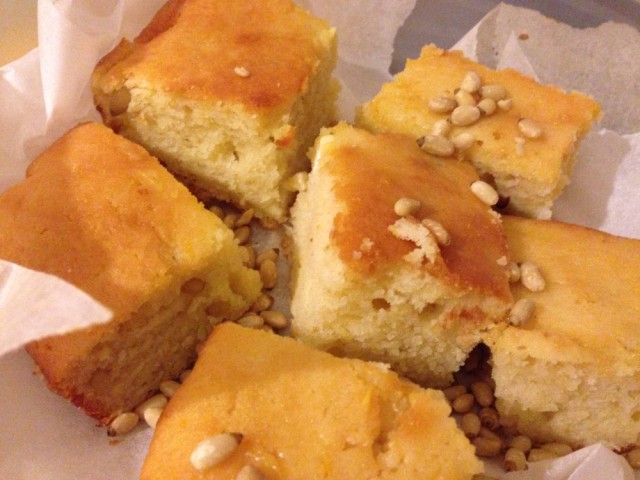
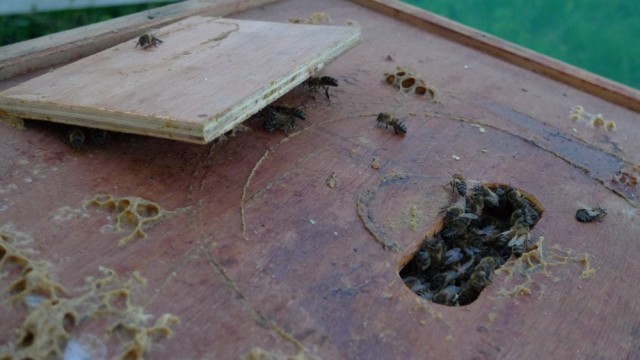

Congratulations for bringing your bees through the winter – not a mean feat these days. Bee keeping does sound like a lot of work. Just like gardening it seems like there are times when the work aspect takes the fore but it makes the results and the pleasures more valuable. Amelia
LikeLike
Thanks Amelia, that is a good way to look at it!
LikeLike
Don’t stop! But do rationalise the sites and storage of equipment. Why not just have a single apiary and store a few necessary items there? You could have an ’empty’ hive or two, with a spare floor, BB, couple of supers (all with frames), QE etc. Seal the entrance or you might acquire a swarm. I’m pretty sure Dave Cushman made a point about storing spares in the apiary. I’ve got a long walk from my car to one apiary and regularly leave boxes over the crownboard ready for the next inspection.
LikeLike
Thanks. Largely thanks to Emma, we do have several spare boxes, floors and QEs at our main apiary at the Ealing association. Also boxes containing smoker equipment, feeding equipment and general things like queen cages and newspaper for hive combining. But as you know syrup shouldn’t be made too far in advance! And I think frames suffer being left outside in the cold, or at least get covered in cobwebs.
Originally the idea behind the allotment site was that it would produce more honey. This has proved to be the case, but I’m not sure the work of extracting it is worth it! The site is paid for up to next spring but after then I may well rethink having the bees there.
LikeLike
Oh no – don’t give up, Emily! Not after you’ve come this far!
LikeLike
Thanks for the encouragement 🙂
LikeLike
Having two sites is quite trying. Which is why I’m never tempted to take up an offer of an outyard. My bees are in m backyard with the equipment stored in the shed nearby, and I find the 4 colonies more than enough work. I couldn’t imagine having to travel to get to them, carrying the equipment! Selling two would help or reducing to one apiary. Then you would need to decide which to pick…
LikeLike
Yep, choosing which one to pick is the tricky part. They both have their good points. The allotment is nearer and the hive there has less competition, but the apiary has tea and company…
LikeLike
Emily, I expanded last year after being offered two nice outyards with 4 hives each. Turned out it was a lovely spring and the bees reproduced with gay abandon. While I discovered my favourite thing about beekeeping is making new colonies, I ended the summer with 30 hives…and felt exhausted, burnt out, not to mention broke from buying all the equipment needed, and had no energy for the honey harvest (which was terrible in our area last year…the final insult!). I am not sure my family got a hot meal or folded laundry all summer. I learned a lot, looking after so many colonies, but this spring am in the process of selling off all the excess colonies (they had a 90% overwintering rate, of course, in the one winter where I really could have accepted losses!), reducing my holdings to the two hives in my yard, and 4 in the nearby community garden (love teaching and leading tours there). That is plenty to care for, and enough that I can still make new colonies (which I will sell!), and this will also give me the time to really slow down and inspect with interest and pleasure, regaining my zen connection with my colonies. I am also shifting my focus from honey production to making new colonies, with honey as the welcome byproduct. I will take up your suggestion to store some of the excess equipment in the beeyards, and hope to catch some swarms thereby! Good tip. And may I please have the recipe for the honey orange cake?!!
LikeLike
30 hives from 8! Amazing. I can imagine just how exhausting it was. 6 should be a much more manageable number, and then you can make a bit of money on the side from selling any extra. I will email you the cake recipe 🙂
LikeLike
I enjoy hearing what’s going on in beekeeping on the other side of the world, Emily. There are other differences I appreciate, too. You appear to have your hives at an urban, community apiary. I have 2.5 acres in a rural eastern Washington state, USA. London is damp and overcast (so I’m told). And it’s dry (7 inches of rain annually) and hot (up to 113 degrees F) here. I enjoy reading your blog. Keep writing.
LikeLike
Thanks. Yes, although the part of west London I live in has quite a lot of parks, it is definitely more urban than rural. We do get drizzle here a lot but it’s not always overcast, sometimes we even need to wear sun lotion! (a couple of times a year, anyway). 118F is really hot. A nice summer’s day here would be 68-77F; on an incredibly hot day it might reach 86F. You will have very different challenges in your beekeeping!
LikeLike
Well cake eating went on at the bbka spring convention . I went for Saturday and booked to see one of your faves Terry Clare . I had to buy se queen rearing books as Emily you haven’t covered that yet on the blog in too much detail. You need to demonstrate your use of at least one method on the General husbandry course which about 7 people from Lancashire are doing in 2016 , but you have to start your records now
LikeLike
Thanks Nicky, no queen rearing isn’t something I’ve got into, have just let the bees get on with it when they need to. Are you taking the General husbandry course?
LikeLike
OMG, don’t stop beekeeping, you are too knowledgeable with so much to share. I can imagine though the work and despair of lost bee colonies can get one rethinking the bee hobby/profession though. I am wondering how long I would last?
LikeLike
Thanks Donna. I am probably just worrying about things too much, should learn to relax more!
LikeLike
You have studied too hard to let go of beekeeping. Plus, we all need to read your blog posts! However, I can’t imagine having to carry equipment on a bus to get to the hives! Ugh. And multiple sites would be difficult. Maybe it’s time for some cake and tea while you contemplate logistics. 😊
LikeLike
Tea and cake always cheers me up and makes everything seem more doable 🙂
LikeLiked by 1 person
Feels a bit sad Emily I may be loosing my beekeeping neighbour. I have never considered giving up but each start of each year I am always anxious and worry it is all going to go wrong and I am filled with what if what if. But after a few inspections it all settles down and then I think of a few extra hives. Remember I have transport and only to happy to help with moving kit for you and help out any way I can even inspect for you if you have no time. You only have to ask.
LikeLike
Thanks Tom, I am probably just letting things get on top of me a bit. That is so kind of you to offer to help and I may take you up on the inspection offer if I go on holiday! I would miss having my bee buddy at the allotment. The worst of the frame making is over now and hopefully we will get the two hives sold soon so that the Ealing hives are down to a more manageable number – at least till they need artificial swarms done!
LikeLiked by 1 person
That’s great Emily just give me a shout if you need a hand or the bees inspecting.
LikeLike
Blimey!
(https://www.youtube.com/watch?v=GnbH2XvCN7c)
It was all going swimmingly: bees doing well, sunshine, flowers, intriguing cake…and then a final bombshell! I’m only surprised because of your evident enthusiasm and knowledge – I suppose we all occasionally consider the possibility of applying our energies in different ways – to enjoy things we haven’t yet made time for. I occasionally feel that way about blogging – and I have had the odd break. Can you have a bee-break and let somebody else look after them for a while and see how much you miss them? Or not?
LikeLike
He he! I have been feeling a bit guilty as Drew doesn’t see me much on Saturdays and I’m always having to rush off. A bee-break might be a good idea, though would be quite an ask for someone else to take on all those bees…
LikeLike
Emily, your blog has been an inspiration and I continue to enjoy it. I received my first bees today and set them up in a fenced-in area of our yard. My daughter was a natural (I am not, I think), and the best part was watching her tend the bees, relaxed and confident. Life brings many choices and I’m sure you’ll make the right one.
LikeLike
Wow Erik, very exciting that your bees have arrived! Moving slowly and gently around them is the main thing. Nice that you have a father and daughter activity you can enjoy together.
LikeLiked by 1 person
There are some amazing meadows with fritillaries still about and Sunday 19th was in fact Fritillary Day. Here are some links to the Magdalen College Oxford Meadow and Ducklington Meadow. I have personally seen the Magdalen one and in season it is a true wonder.
http://www.ducklingtonparishcouncil.gov.uk/the-parish/ducklington-fritillaries/
http://www.telegraph.co.uk/gardening/plants/10741803/Fritillaries-dont-forget-these-lilies-of-the-field.html
http://www.isabellaunderhill.co.uk/#!fritillaries-magdalen-college-meadow/zoom/c1hpk/image1ri1
LikeLike
How lovely! I have only ever seen one or two in flower at a time. Is the Magdalen College Meadow open to the public?
LikeLike
Yes it is, but they do charge for entering the College. Here is the info about times etc: http://www.magd.ox.ac.uk/discover-magdalen/visiting-magdalen/
LikeLike
Sorry should have added this: http://www.magd.ox.ac.uk/news/fritillaries/
LikeLike
Briliant, thanks. I’m meeting a friend in Oxford in May – probably too late for the fritillaries, but perhaps I can catch other meadow flowers.
LikeLike
It is entirely natural to get so caught up in beekeeping that you find yourself one day the keeper of six hives. But, at a certain point, the hives start to keep you. Unless you are a commercial keeper or a full-time hobbyist running a little honey concern on the side, the work of it will overwhelm the love every now and again. There are other ways to enjoy bees, down-sizing an option already mentioned. But cutting and running? You know I have nowhere near your dedication. So I quite surprised myself, when I lost one of my two hives this winter, by becoming overly-concerned about losing the remaining one. A life without bees? Unthinkable! It would feel like a bit of a wrench, as if I would become unhitched from the rest of nature (a bit dramatic but am under the influence of cold medicine and Helen MacDonald at the mo’). See what the summer brings, as you say, and think about all the options….
LikeLike
Perhaps you are right – what if I removed bees from my life and then felt a big hole? Getting new bees is not that easy unless you are lucky enough to catch a swarm. I felt in touch with nature before I kept bees though. There would always be walks in local parks and visits to places like London zoo and London wetlands centre. But my adventures with bees will continue for a while yet I’m sure. A summer at least.
Get well soon!
LikeLike
Great article, I am looking forward to more!…subscribed!
LikeLike
Thanks 🙂
LikeLike
Giving up is too permanent, but I think it’s something many hobbyists think about doing when beekeeping is no longer new and exciting, but life would be grim to have to go without home produced honey!
Having two apiary sites makes sense, because the second one could be needed in a hurry, but there doesn’t have to be a colony there all the time. Why not try to rationalise things and make it all easier to manage?
LikeLike
Hmm… I think in this case there does need to be bees at both sites if I’m going to keep the two sites. Under the terms of the allotment agreement I’m meant to be either cultivating the allotment or using it to keep bees. There is a huge waiting list for the allotment but I bypassed that because people kept turning the plot down as it’s not a great site for gardening.
And at the Ealing apiary they are very strict about not bringing bees in, new colonies are not often allowed onto the site. So if we stopped keeping bees there it would be difficult to start again.
LikeLike
You probably can’t sublet your allotment to another beekeeper, and having bees already there makes it not much use as an isolation and colony assessment apiary, but even so having two sites is useful if you can manage to run them both.
From what you’ve said up there it’s the time it all takes, I think, and the impact on your non beekeeping life. Maybe reducing the number of colonies will be the answer?
LikeLike
Yes, I hope reducing the number will help. And then sell any extra that come from needing to do artificial swarms. You’re right, having two sites is useful if I can manage them properly.
LikeLike
Bravo! I’m glad all your hives have survived the winter. They will keep you busy this season…happily busy.
LikeLiked by 1 person
Horizontal hives are fairly self-contained and not requiring much in the way of excess equipment. If you dimensioned a Tanzanian correctly you could even carry on with the frames you currently use. If you wanted a bit of a change…
LikeLike
That’s a thought, thanks. They do take up twice as much space though!
LikeLike
And can be quite heavy if you ever need to move the entire hive since they do not break apart.
LikeLike
I have been meaning to respond to this post since I read it one night on my mobile. But my response has had to wait a month due to life getting in the way.
Don’t give up. Make it easier for yourself. Could you find somewhere nearer for the bees? A school? A house with grounds? Knock on some doors. And don’t put too much pressure on yourself with the blogging. Just do it as and when. The most important thing is to be happy, not too busy and have time to sit on a bench or lie on the grass in the sun.
I have come to the possible end of my journey in my search for a better bee suit. That said, due to my bad beekeeping, all the aggressive bees have gone and I have 2 gentle nucs!
LikeLike
Thanks, I completely understand about life getting in the way. I think something like a house or school would worry me too, just in a different way – I’d always be thinking about the chance of them swarming! The blogging I am not worried about, just the bees.
Sitting in the sun is so important, you’re right. Congratulations on having only gentle bees now!
LikeLike
… and you have “27 bloggers like this” and 43 comments! you’re doing great.
LikeLike
Well, half of the comments are my replies, so 21ish really! But yes, I’m very lucky to have such lovely readers.
LikeLike